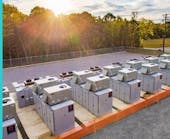By Rod Walton, EnergyTech Senior Editor
These are the times that try event planners’ souls.
The Covid pandemic hasn’t gone away, and yet we yearn for human interaction and learning from each other while in the same room with each other. Zoom meetings and webcasts are fine as far as it goes, but it never offers the same connecting experience.
And so I journeyed to Cleveland this week to attend the Manufacturing and Technology Show. The M&T event, led by our parent firm Endeavor and the excellent IndustryWeek team, was going live for the first time in two years, with all plausible precautions in place.
I’m an energy guy, but I started by business journalism career in covering manufacturing. Below are a few highlights I experienced while in Cleveland. Most of them are related to energy:
Lt. Gen. Russel Honore’, the now retired hero of Task Force Katrina some 16 years ago, gave a spirited, earthy keynote which touched on old-time values while being cognizant for the future needs of our economy and environment.
America needs to saddle up, like Washington did on Nelson when he rallied his troops to a rare early victory at Trenton, and gallop straight at problems like climate change and the challenges of global competition, the general said.
“Our future economy will depend on us doing things we think are impossible today.”
Eric Gebhardt, chief technical officer for train industry manufacturer Wabtec, detailed how his company was leveraging emerging technologies to drive sustainability both in the factory, on the tracks and around the world. Wab has put out thousands of locomotives and other parts for numerous railroad firms, and those machines are changing in dramatic ways to benefit the climate and, no less importantly, get the cargo from Point A to B in safe, timely fashion.
Employing artificial intelligence and large-scale battery technologies to help Wabtec eliminate wasteful energy use. The goal is reducing emissions 60 million tons annually, compared to moving the same level of freight via trucking.
The company’s experimental FLXdrive 1.0 battery-electric locomotive drive is proving valuable after more than 13,000 test miles. The FLXdrive carries a 2.4-MWh battery system driving the motors, with four powered axles.
In the not too distant future, the FLXdrive 2.0 will be fueled by a 7-plus MWh battery driving six powered axles. The goal is 30 percent lower greenhouse gas emissions.
The batteries can recharge via dynamic braking, less extending the efficiency of the route.
Google also is deploying AI and machine learning tools, as well as renewable energy purchase deals and on-site battery systems, to lower its carbon footprint, onetime company energy executive Raiford Smith noted.
(Rod Walton, senior editor for EnergyTech, is a 14-year veteran of covering the energy industry both as a newspaper and trade journalist. He can reached at [email protected]).





